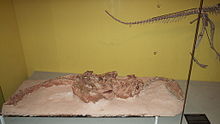瓜巴龙属
| 瓜巴龙属 化石时期:三叠纪后期,
| |
|---|---|

| |
| 编号ULBRA-PVT016标本,头部、颈部是参考艾雷拉龙而重建 | |
| 科学分类 | |
| 界: | 动物界 Animalia |
| 门: | 脊索动物门 Chordata |
| 纲: | 蜥形纲 Sauropsida |
| 总目: | 恐龙总目 Dinosauria |
| 目: | 蜥臀目 Saurischia |
| 亚目: | †蜥脚形亚目 Sauropodomorpha |
| 科: | †瓜巴龙科 Guaibasauridae |
| 属: | †瓜巴龙属 Guaibasaurus Bonaparte et al., 1999 |
| 模式种 | |
| 坎德拉里瓜巴龙 Guaibasaurus candelariensis Bonaparte et al., 1999
| |
瓜巴龙属(属名:Guaibasaurus)是基础蜥脚形亚目恐龙,生活于三叠纪晚期的南美洲。瓜巴龙的化石在发现于巴西南里约格兰德州。如同艾雷拉龙,瓜巴龙的每只手掌有三指及退化的两指[1]。
模式种是坎德拉里瓜巴龙(G. candelariensis),是由何塞·波拿巴及J. Ferigolo在1998年描述、命名。
发现
[编辑]

正模标本(编号 MCN PV2355)是一个保存良好的部分身体骨骼。副模标本(编号 MCN PV2356)则是一个接近完整的左后肢,关节仍呈连接状态。这两个化石都发现于巴西南里约格兰德州,位于著名的Paleorrota地质公园内,都是在名为“Prό-Guaíba Project”的挖掘化石计划而发现。在瓜巴龙被命名后,近年在Paleorrota地质公园的另一个挖掘地点,发现另外两个标本。编号 UFRGS PV0725T 的标本是一个身体骨骼,缺少颈部、一个前肢、两个脚掌。编号 MCN PV 10112 的标本仍位在石块中,还没有经过去除石块的手续[1]。这些化石都发现于Caturrita组地层的下部,地质年代相当于2亿1650万到2亿1200万年前,相当于三叠纪晚期的早诺利阶[1][2]。
近年新发现的编号UFRGS PV0725T标本,缺少大部分颈椎,但根据仅存的基部颈椎,显示这个个体在死亡前,颈部是朝向左方弯曲的。而根据化石的其他部位,后肢卷曲于身体下方,前肢摆向身体侧方,这个姿势很类似现代鸟类。在发现这个化石以前,只有手盗龙类化石层发现这种鸟类睡眠姿势。研究人员推测,瓜巴龙可能采取这种姿势睡眠,以保持体温,如同现代鸟类[3]。
词源
[编辑]在1999年,阿根廷古生物学家何塞·波拿巴等人将正模标本、副模标本叙述、命名。模式种是坎德拉里瓜巴龙(Guaibasaurus candelariensis),属名里的Guaíba,是南里约格兰德州的地名,也是“Prό-Guaíba Project”挖掘计划的名称来源;种名则是以邻近的Candelária市为名[4]。
演化与分类关系
[编辑]在1999年的命名研究里,约瑟·波拿巴等人提出瓜巴龙是个原始兽脚类恐龙,并归类于独自的瓜巴龙科。在2007年,约瑟·波拿巴等人发现农神龙非常类似瓜巴龙,而农神龙也生存于相近时代的巴西。约瑟·波拿巴等人将瓜巴龙、农神龙都归类于瓜巴龙科,并将瓜巴龙科改归类为原始蜥脚形亚目恐龙,或者与蜥脚形亚目、兽脚亚目的最近共同祖先是近亲。约瑟·波拿巴等人也提出,瓜巴龙、农神龙的外形比较类似兽脚类恐龙,而较不类似蜥脚形恐龙[5]。发现新化石后,近年研究多倾向于瓜巴龙科是群非常原始的蜥脚形类恐龙[6][7][8]。但瓜巴龙本身的分类位置仍有争议,有些研究认为是原始兽脚类恐龙[1],其他研究则认为是原始蜥脚形恐龙[9][10]。
参考资料
[编辑]- ^ 1.0 1.1 1.2 1.3 (英文)Max C. Langer, Jonathas S. Bittencourt and Cesar L. Schultz. A reassessment of the basal dinosaur Guaibasaurus candelariensis, from the Late Triassic Caturrita Formation of south Brazil. Earth and Environmental Science Transactions of the Royal Society of Edinburgh. 2011, 101 (3-4): 301–332. doi:10.1017/S175569101102007X.
- ^ (英文)Marina B. Soares, Cesar L. Schultz and Bruno L. D. Horn. New information on Riograndia guaibensis Bonaparte, Ferigolo & Ribeiro, 2001 (Eucynodontia, Tritheledontidae) from the Late Triassic of southern Brazil: anatomical and biostratigraphic implications (PDF). Anais da Academia Brasileira de Ciências. 2011, 83 (1): 329–354 [2012-04-04]. (原始内容存档 (PDF)于2015-09-24).
- ^ (英文)Agnolin, F.; and Martinelli, A.G. Guaibasaurus candelariensis (Dinosauria, Saurischia) and the early origin of avian-like resting posture. Alcheringa. 2012, 36 (2): 263–267 [2012-04-04]. doi:10.1080/03115518.2012.634203. (原始内容存档于2020-05-05).
- ^ (英文)José F. Bonaparte, Jorge Ferigolo and Ana Maria Ribeiro. A new early Late Triassic saurischian dinosaur from Rio Grande do Sol state, Brazil (PDF). Proceedings of the Second Gondwanan Dinosaur Symposium, National Science Museum Monographs. 1999, 15: 89–109.
- ^ {{enBonaparte, J.F., Brea, G., Schultz, C.L., and Martinelli, A.G. (2007). "A new specimen of Guaibasaurus candelariensis (basal Saurischia) from the Late Triassic Caturrita Formation of southern Brazil." Historical Biology, 19(1): 73-82.
- ^ (英文)Yates, Adam M. The first complete skull of the Triassic dinosaur Melanorosaurus Haughton (Sauropodomorpha: Anchisauria). In Barrett & Batten (eds.), Evolution and Palaeobiology. 2007, 77: 9–55. ISBN 9781405169332.
- ^ (英文)Pol D., Garrido A., Cerda I.A. A New Sauropodomorph Dinosaur from the Early Jurassic of Patagonia and the Origin and Evolution of the Sauropod-type Sacrum. PLoS ONE. 2011, 6 (1): e14572 [2012-04-04]. Bibcode:2011PLoSO...614572P. PMC 3027623
 . PMID 21298087. doi:10.1371/journal.pone.0014572. (原始内容存档于2011-01-30).
. PMID 21298087. doi:10.1371/journal.pone.0014572. (原始内容存档于2011-01-30).
- ^ (英文)Cecilia Apaldetti, Ricardo N. Martinez, Oscar A. Alcober and Diego Pol. A New Basal Sauropodomorph (Dinosauria: Saurischia) from Quebrada del Barro Formation (Marayes-El Carrizal Basin), Northwestern Argentina. PLoS ONE. 2011, 6 (11): e26964 [2012-04-04]. doi:10.1371/journal.pone.0026964. (原始内容存档于2011-11-12).
- ^ (英文)Ezcurra, M. D. A new early dinosaur (Saurischia: Sauropodomorpha) from the Late Triassic of Argentina: a reassessment of dinosaur origin and phylogeny. Journal of Systematic Palaeontology. 2010, 8 (3): 371–425 [2012-04-04]. doi:10.1080/14772019.2010.484650. (原始内容存档于2020-03-13).
- ^ (英文)Fernando E. Novas, Martin D. Ezcurra, Sankar Chatterjee and T. S. Kutty. New dinosaur species from the Upper Triassic Upper Maleri and Lower Dharmaram formations of central India. Earth and Environmental Science Transactions of the Royal Society of Edinburgh. 2011, 101 (3-4): 333–349. doi:10.1017/S1755691011020093.
外部链接
[编辑]- (中文)瓜巴龙 (页面存档备份,存于互联网档案馆)
- (葡萄牙文)Dinosaurs of Rio grande do Sul.













